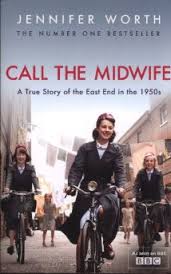I watched two programmes on ABC television this weekend which caught my interest.
The first was a re-run of “Call the Midwife”. I have loved both series of this feel-good programme about life in post-war, poverty-stricken London.
It is about a group of midwives working out of a nursing convent, which is part of an Anglican religious order.
When it was first advertised I was reluctant to watch it because of it being based in a religious convent. And the religion is a core part of the storyline.
The series takes a positive slant on how religion impacts on the community.
Despite that, I thoroughly enjoyed it. And I believe the reason is that its focus is on women – and women as a community.
(As an aside I also wonder whether women find some kind of sanctuary in convents – away from men’s gaze. I have also often thought if convents, at some time, may have acted as women’s refuges do today, in providing a safe haven for women escaping abusive men. Rather ironic given that Church organisations are increasingly taking over women’s shelters here in Australia.)
The programme does not shy away from the hardships and poverty that the women experience in this part of London. It tackles issues such as domestic violence, abortion (backstreet of course), teenage pregnancy, racism, miscarriages, poverty and the challenges of disability.
For example, Saturday night’s programme was about a woman tramp, living on the streets in extreme poverty and racked with disease and illness. We learn that she has spent 30 years in a workhouse in London. She is forced to go there with her 5-6 children as a result of poverty. Her children are immediately removed from her – put in another section of the workhouse. She never sees them again – but knows that they have died because she can no longer hear their cries. The programme makes no effort to romanticise the terrible treatment that such women received under the Workhouse conditions.
It is the heartbreaking stories that are handled both realistically and sympathetically which makes this such a successful programme.
For me, however the success of the story is that it is about women – told from their perspective, highlighting their lives – and whilst it may romanticise the relationships in this community of women, and their relationship with the church, this is what I find most empowering about the programme. This is how women survive oppression – by standing by each other, by supporting each other, by being a community together.
However, I am quickly brought back down to earth by watching on Sunday night – ‘World without End’. I understand that it is based on a book by Ken Follet, which I have not read and know nothing about.
It is set in the aftermath of a civil war in Medieval England, during the 1300’s. And aptly shows the difficulties, the violence and frailty of life in these times.
The programme presented strong female characters – but also illustrated how misogynistic the society was. A woman is sold to a man for a cow; another is forced to marry in order to secure her father’s business interests – and is subjected to violence and rape; and the female healer of the town is labelled a witch and executed.
And the backdrop of these happenings is the powerful church – and its blatant misogyny.
I couldn’t but reflect on the different images of the church that these two programmes show.
For centuries the church has demonised, ostracised, condemned and oppressed women. The Medieval Church helped lay the groundwork for the current misogyny of religion today. There is no doubt that the church today continues to be misogynistic. The oppression that women in the 1950’s faced, and continue to face today – such as anti-abortion laws; demonising of single mothers and teenage pregnancy and the cruelty shown towards women who don’t fit the norm – stem from a long history of oppression of women by the church.
But somehow women survive; they create communities and allegiances and they struggle against their oppression.




One Response
Keep on working, great job!